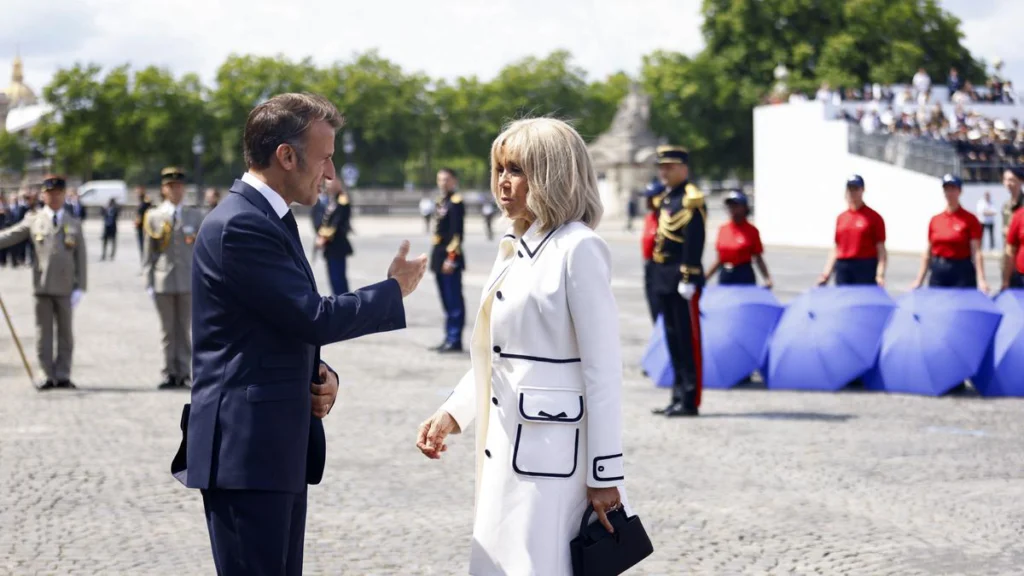French president Emmanuel Macron sues right-wing podcaster over claim France’s First Lady was born male

Tulsi Gabbard, former U.S. Representative and presidential candidate, recently stirred controversy with her claims about a conspiracy against former President Donald Trump. She alleges that various U.S. government agencies and intelligence officials colluded to undermine Trump’s presidency. According to Gabbard, declassified documents provide evidence of this alleged conspiracy. However, after a careful review, the Associated Press (AP) found no evidence to support her claims.
The AP’s findings directly challenge Gabbard’s accusations. Despite her assertions, the documents do not back her narrative. The claims she has made about a coordinated effort to undermine Trump’s presidency are unsubstantiated. In this article, we will explore Gabbard’s allegations, review the declassified documents, and explain why they fail to support her claims.
Gabbard’s Allegations and the “Deep State” Narrative
Gabbard claims that certain FBI and CIA officials worked together to prevent Trump from taking office. She argues that these individuals, part of a so-called “deep state,” actively coordinated their actions to sabotage Trump’s presidency. Gabbard also cited the Steele dossier, which has been widely debated, as evidence of the alleged conspiracy.
This idea of a “deep state” has been circulated by other political figures, especially those aligned with Trump. These individuals claim that government agencies are acting against the interests of the president. Gabbard, echoing this narrative, argues that the release of these declassified documents proves that a coordinated effort was underway to thwart Trump’s presidency.
The Declassified Documents
Gabbard referenced several declassified documents in support of her claims. These documents include intelligence assessments, memos, and reports related to the investigation into Russian interference in the 2016 U.S. election. Gabbard contended that these documents demonstrated collusion between intelligence agencies and political figures who were allegedly working against Trump.
However, the AP’s review of these documents revealed a different story. While the documents shed light on Russian interference, they do not show any coordinated political effort to undermine Trump. Instead, they reflect the U.S. government’s concerns about national security and foreign interference in the election.
The AP’s Findings: A Lack of Evidence
After reviewing the declassified documents, the AP concluded that they do not support Gabbard’s claims. The investigation into Russian interference was based on legitimate national security concerns. The documents show that U.S. intelligence agencies acted to safeguard the election process, not to politically undermine Trump.
Furthermore, the Steele dossier, which Gabbard highlighted, was part of a broader investigation into Russian influence. It was not part of a plot to delegitimize Trump. The documents provide no evidence of a “deep state” working against the president, undermining the core of Gabbard’s claims.
Why Gabbard’s Claims Fail to Hold Up
The primary issue with Gabbard’s allegations is the absence of concrete evidence. The documents she referenced do not substantiate her claims of a coordinated conspiracy against Trump. Instead, they demonstrate the U.S. government’s response to foreign interference. The investigation, while extensive, focused on safeguarding the electoral process and protecting national security, rather than undermining a sitting president.
Moreover, the broader investigation into Russian interference, including the Mueller Report, did not find evidence of collusion between Trump’s campaign and Russian operatives. This further weakens the credibility of Gabbard’s claims. Without solid evidence, her accusations seem to be based more on speculation and political rhetoric than on facts.
The Dangers of the “Deep State” Narrative
The concept of a “deep state” has gained traction in certain political circles. However, it lacks factual support. While it’s true that government agencies can be bureaucratic and inefficient, the idea of a coordinated effort to undermine a president is unfounded. Gabbard’s claims fit neatly into this narrative but fail to meet the standard of proof required for such serious accusations.
Promoting these types of conspiracy theories can have harmful consequences. They sow distrust in the government and fuel division. The more these ideas spread, the harder it becomes for citizens to trust institutions meant to serve and protect them.
The Impact of Misinformation
Gabbard’s claims about an anti-Trump conspiracy contribute to the broader issue of misinformation in U.S. politics. Public figures, especially those with large platforms, have a responsibility to be cautious about spreading unverified claims. When individuals like Gabbard make unfounded allegations, they risk misleading the public and further polarizing political discourse.
Misinformation, especially when it targets public figures and institutions, can erode public trust. As a result, it becomes more difficult to have constructive debates and work toward solutions. Gabbard’s claims, lacking evidence, only contribute to this problem. It’s essential for leaders to base their statements on facts to ensure that the public is well-informed.
The Role of Media in Scrutinizing Claims
The media plays an essential role in evaluating and reporting on claims made by public figures. When figures like Gabbard make bold accusations, it’s important for the media to scrutinize these claims carefully. The AP’s review of the declassified documents serves as a model for responsible journalism. By investigating and verifying information, journalists help prevent the spread of misinformation.
It is also important for the public to critically engage with information, especially in the digital age. Social media and podcasts allow unverified information to spread quickly. As a result, it’s up to consumers of media to be discerning and demand evidence-based reporting.
Conclusion: The Need for Responsible Political Discourse
Tulsi Gabbard’s claims of an anti-Trump conspiracy do not hold up to scrutiny. The declassified documents she referenced fail to provide evidence of a coordinated effort to undermine Trump’s presidency. The documents focus on national security and Russian interference in the election, not political maneuvering.
Gabbard’s claims, based on speculation rather than fact, highlight the dangers of misinformation in modern politics. It is crucial that political figures base their statements on verifiable information. The public deserves transparency and accountability, and it’s the responsibility of both leaders and journalists to ensure that claims are thoroughly vetted before being presented as truth.






